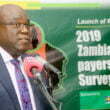The Financial Intelligence Center (FIC) says every piece of information that is contained in its trends report is backed by factual evidence that can easily be used by law enforcement agencies if they wish to prosecute perpetrators of financial crimes.
In this verbatim interview, FIC board chairman John Kasanga reacts to accusations that the center is fighting personal battles and releasing unverified information to the public against the law.
Q. Do you have facts to support the claims that you make in the trends report and is it legal for you to publicise your findings to the public in the manner you do?
A. I think before you talk of the legality, let me just give you a bit of context with the trends report. The trends report helps to highlight to stakeholders the key types of crimes that we have picked up in the year and as we have analysed intelligence. So when we give you the trends, we are drawing the attention of the stakeholders, the public and even our colleagues in law enforcement, reporting entities to say ‘guys, these are the main types of crimes which are emerging from the analyses we are doing’. And we need to look at prevention and deter these crimes.
Q: Is this verified data?
A: The FIC does not disseminate where it has doubts. Where we ourselves have doubts, we don’t disseminate. When we talk about 425 disseminations, it means these are dossiers that we have prepared over the 425 cases and passed them on to law enforcement agencies. So the dissemination that we make to the general public and even us as board members, we don’t delve into the names of individuals involved. We look at what we call typology. What kind of activities are happening in the area of financial crimes? What are the predicate crimes that we can pick up is it tax evasion, is it bribery, theft or money laundering? Those are what we call typologies which we link to what we call predicate crimes. You know, for example if you are paying someone off, it can either be for bribery or it could be an act of corruption. Bribery and corruption are predicate crimes which are prosecutable. Then now when we come to typologies, it is the type of predicate crimes. So when you look at our trend reports, we say ‘look, from the reports we have analysed, so much is linked to tax evasion, so much is linked to corruption, so much is linked to crimes related to procurement, where either someone is favoured or grossly inflated figures are allowed, which you now bring in issues of abuse of office. And of course the predicate crime could be corruption. So when it comes to sharing with the public, we are sharing with the public the actual trends and highlighting examples of cases we have disseminated to law enforcement.
Q. We have been given a picture that what you do is that if I sell a Toyota Corolla myself and I deposit that money and it exceeds $5,000 then you go and get that information from my bank account and report it as a suspicious financial transaction.
A. No, nothing like that. There are cash transaction thresholds that are reportable and that is just kept in the database. If you are getting $5,000 or $10,000 but you are not a person of interest, that’s just a dossier, if next we hear or we get another suspicious transaction that you have been awarded a tender and this tender involved A, B,C,D then your banking practices in terms of getting money, we flag them out, we see ‘are there any patterns that we can associate with this particular transaction or is there something about this person’s source of income suddenly changing? And you see, if every month you receive a salary and the salary range is clear, it could include allowances, it could include leave days, it could include so many things, there is nothing suspicious. But if suddenly you see a million kwacha in that account, that’s an activity that is irregular in terms of the kind of occupation that this person is involved in so it becomes something you want to analyse.
Q. So it doesn’t mean that every suspicious transaction is contained in this report and it makes up this K4.5 billion?
A. No, The K4.5 is strictly those suspicious transactions that from our view as FIC, constitute criminal activities, basically, there is a prima facie that there is a crime that has been committed. In other words, there is enough circumstantial evidence to establish a crime. If we were to gross up all the suspicious transactions which we receive, it would go into billions and billions. But of interest in our report is that the K4.5bn is limited to the cases that we analysed and disseminated to law enforcement. It is not wrong to release this. It is more than data. These are cases where we have dug and believe cases of crime are involved, there is evidence.
Q. The chief government spokesperson has categorically said that you as FIC are actually giving rumours to the public to incite the public and some other stakeholders like the former minister of finance Alexander Chikwanda has said that your report is exaggerated and sensational meant to excite the public.
A. I think what is being missed is that the public themselves are becoming more sensitised with how public finances are managed. It has got nothing to do with the FIC. The FIC, if anything, is providing what perhaps someone who is serious would say grounds for the public to be concerned and sensitised.
Q. That brings me to the issue of legality. Are you mandated to give to the public the information like what you did at the press conference with the Attorney General?
A. We have always done it, they are called trends. There is no single individual named in any of those case studies. What we mention are the amounts and what we give is what we call a completely sanitised summary just to help sensitise the public because these cases of corruption involve Zambians at every level. And we are mandated in the law to engage the public. And we are a public institution.
Q. In fact, the PF deputy media director Antonio Mwanza actually said you are actually like the Office of the President so how come unlike that office, you as FIC release such information?
A. (Laughs) The Office of the President is very different, they deal with security as far as I am aware. We deal with trying to identify cases of financial crimes occurring in the country or issues of terrorism, issues of money laundering. So our focus, in international classification, we are called an administrative FIU, in that we just analyse, if we had prosecutorial powers, it would be different. Of course we collaborate with the Office of the President because financial crimes in a number of cases also border on security of the country, in many ways. Like terrorism financing or what we call proliferation financing where people are getting money and building bombs or they are mobilising money from Zambia to send to guys who make bombs, that’s called proliferation financing. So there is a need to work closely with the OP but we have different mandates.
Q. What is your relationship with the law enforcement agencies? We have been given a picture that there isn’t very good cooperation.
A. We give them what we believe is actionable intelligence capable of them finalising investigations and prosecuting. We have memoranda with all of them and we have always worked closely. But remember, we cannot question their own actions because they are accountable to powers that be separately. In other words, they have got a mandate that they themselves are required to discharge…so we collaborate closely and we believe we have a good relationship with them but perhaps what needs to be interrogated is a concerns that if we have given them so many disseminations, what are the problems that they face? What makes it so difficult for them to finalise and prosecute the cases? We have given the information but remember, we are not in control of the law enforcement agencies, they have got their own mandate, their own procedures and they will make their own decisions as to whether to go further or not or whether they don’t feel satisfied that this is a case they should prosecute.
Q. The director of the FIC Mrs Mary Tshuma has come under a lot of attack and some people believe that she is fighting personal battles. What is the situation? How safe is she and what is the FIC doing to ensure that not only is she protected but she if operating without engaging in personal battles?
A. It is not possible for her as an individual to fight personal battles because there are very clear guidelines in terms of duties, in terms of analysis. In terms of cases, her level of engagement, remember, she is coming in with investigation, prosecution experience. Secondly, she had headed the anti-money laundering at DEC, she has got a lot of experience in the cases that we handle at FIC and we have a whole chain of analysts and we make sure that no single one person has all the information because they could be compromised. You can compromise a single officer at FIC and they start disclosing things that undermine the work or give leads to perpetrators so that they can take other action. So it is much easier to point a finger at her because she is the head of the institution but she is mandated by law and things are done in her name by law as Director General.
In terms of safety, it is always an issue of concern to the board. We worry extensively about all staff, not necessarily herself, and because she is the face of the FIC, she is bound to be singled out and the assumption that without her then the FIC is dead, it doesn’t work like that. Even if, for arguments sake, our Director General has a personal agenda with someone, the evidence that she will need to provide must be able to satisfy a prosecutor and that decision is not made by FIC but by law enforcement.
Q: There is a concern that people will now start burying money instead of banking it for fear of the FIC.
A: Perhaps that is what people don’t understand that in the olden days when banks were using paper, they had files and files, it was difficult because it was a lot more complex. But these days, the moment you go to the ATM and draw cash, the moment you leave the ATM, your phone is telling you that you have withdrawn this much isn’t it? That’s the society we are in now. So I would say it is difficult for criminals to hide their proceeds of crime. Even if they take them to a jurisdiction that is away, there has to be a process of taking the money into that jurisdiction. And international currencies go through payment systems that still pick up that transaction. If it is the purchase of a car, somebody has to go and play with records at RTSA. That’s why I am saying let’s sensitise the public because for someone to go and alter records at RTSA, they have to do it with an employee of RTSA or employees of RTSA. Even if you barry the proceeds of crime, at some point it will have to be dug out to be spent and it will be traced.
Q. Are you seeing any government support towards your cause?
A. We really thank God that now the government has really maintained its commitment to supporting the FIC. It is attractive to dismantle it but then Zambia is a state party to an international treaty. All countries must have an institution of a type like FIU. As Zambia we need to pay attention to this especially that we are going through financial challenges in being able to match recourses to development plans. It is extremely important that every ngwee is put to its intended use in the most economic way.
Q. Thank you very much
A. You are welcome












